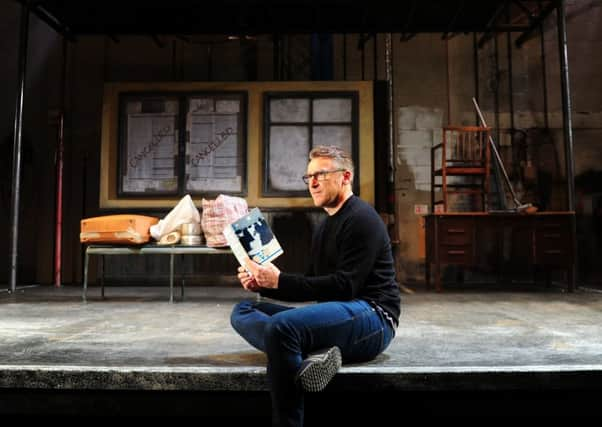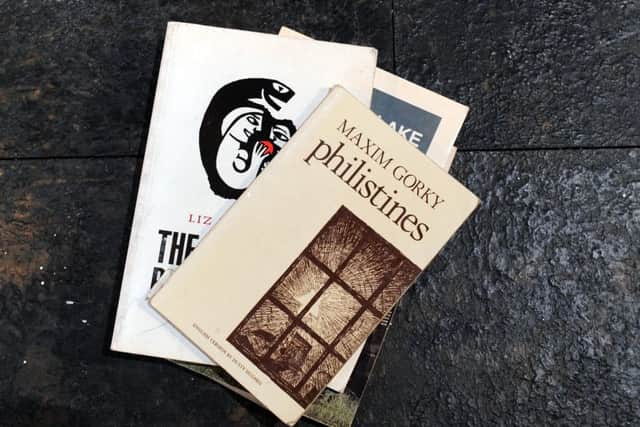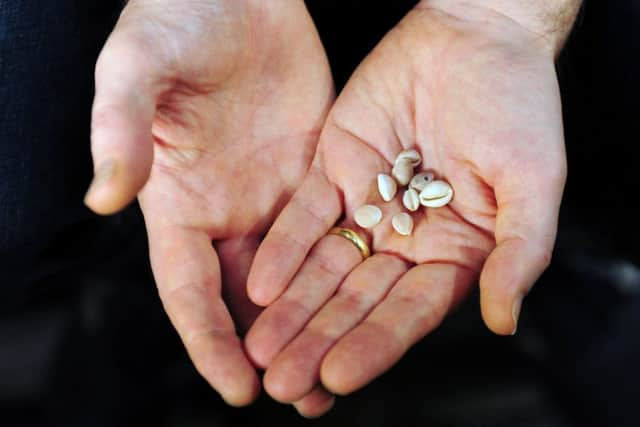Why Leeds Playhouse's creative director James Brining carries shell collection everywhere


AS a child growing up in Chapel Allerton, a suburb of landlocked Leeds, James Brining didn’t know the seaside well enough to long for it after the family had turned its back on a summer day out in Scarborough.
Decades on Brining, now 50, never goes anywhere (except, presumably on his runs around the suburbs) without a tiny collection of cowrie shells, or ‘groatie buckies’, as they’re known in northern Scotland - where he profoundly connected with the sea for the first time. Tucked away in his wallet is one perfect wee mollusc shell representing each of those he holds most dear. “If I lost one, I’d have to get up there and replace it,” he says. There’s more than a hint of superstition here.
Advertisement
Hide AdAdvertisement
Hide AdBut groatie buckies are not easy to find...and that seems to be part of the point. A likely trove is on a beach at Brough of Birsay in Orkney, Brining’s wife Beverley’s birthplace.


“From there you can turn towards the USA in one direction and Norway in the other,” says Brining. “There’s a causeway walk to a little island at low tide, which is then covered as the tide races in. You only really find the shells on that beach and a few other random places.
“The exercise of walking across the beach on sloping sand, then sifting, is meditative and calming. You can’t really think about anything else. The sea had never been a feature of my life, but in Orkney, where you’re surrounded by water, you can see forever. History is also so present there - from incredible 5,000 year old archaeology to marks left during the 18th century and up to the First World War. I love the sense of being connected not only to the place but to other times.”
After leaving behind university student drama societies where he first directed plays, Brining learned his craft at various arts organisations large and small and mostly in the south, before taking the helm at Dundee Rep Theatre for eight highly successful years. He also settled down with Beverley and their four children - then in 2012 fetched up back in Leeds as creative director of West Yorkshire Playhouse.


Advertisement
Hide AdAdvertisement
Hide AdContinuing the ethos of diversity and inclusivity that Jude Kelly and Ian Brown had espoused before him, his ambition was to take everything further, wider, bigger. No longer the new kid on the block, comfortable in his home city and in his own skin, Brining’s own creativity is probably just entering its most potent phase. Anyone who saw his recent near-flawless and utterly relevant production of David Greig’s Europe was in no doubt of this a few minutes after the lights went down.
Audiences have grown over the last three years thanks in part to extensive community outreach programmes aimed at drawing in hard-to-reach sectors of the city.
It was the idea of situating the theatre at the cultural heart of a greater Leeds city region and the urge to raise awareness of both the theatre and city in the national consciousness that led to the decision to rename it as Leeds Playhouse. That was in June. A few weeks later the building was dark, shrouded inside a chrysalis for a 15-month, £15.8m refurbishment that will make the building more accessible and oriented towards the city, and with three main performance spaces instead of two.
“The new Playhouse will manifest in bricks and mortar our values and beliefs,” he says. “My feeling when I came here was that the building was rather closed off. People will more easily be able to come in and just sit in our wonderful open spaces if they want. This kind of non-commercialised space is rarer in our society now, and yet it’s important.”
Advertisement
Hide AdAdvertisement
Hide AdDuring the regeneration, a 350-seat Pop-Up theatre continues to serve the Playhouse’s audience with productions performed by a gifted repertory company of 10. In between directing some of the those productions, including the current, packed-out A Christmas Carol, the creative director is in demand elsewhere. His Magic Flute opens up the road at The Grand Theatre later this month, and he’ll also be directing in Copenhagen.
One of the many reasons he was excited to return to Leeds after building his career elsewhere for more than 20 years was his beloved Leeds United. This brings us on to his second object: a battered paperback copy of V, a narrative poem by Tony Harrison, another Leeds lad made good.
It tells of how the poet walked through the cemetery in Holbeck where his parents were buried and found the gravestone defaced with graffiti by football hooligans.
It goes on to examine divisions in society under Margaret Thatcher and rage against the decline of northern industrial towns and cities. The poem’s ripe language outraged those who were easily outraged. Apart from his love of the power of this poem for itself, and Harrison’s own performance of it in his Leeds accent, it also takes James Brining back to years as a teenage fan walking all the way to Elland Road because he feared aggro from other fans on the bus.
Advertisement
Hide AdAdvertisement
Hide Ad“It was a very visceral, adult environment at the time, and I remember very clearly the smell of beer and fags - quite a raw experience.” He paid his 50p and went to the boys’ pen. While waiting for kick-off, he’d read TS Eliot or Harrison or Jane Austen - which seems to speak volumes about his confidence in handling himself back then. A few years later, when he was working not terribly happily in Basingstoke, joining the tribe of travelling Leeds fans at matches against London teams became important in connecting Brining to his home city.
His third object is another battered paperback, of Maxim Gorky’s 1901 debut play Philistines. A story of family disintegration, it foreshadowed the Russian Revolution and was a shape-changer in its use of naturalism on stage. It’s another iconoclastic work, that caused apoplexy among the theatrical establishment and was blamed for riots in the streets.
“I’m drawn to intense stories, and it was the first play I directed at university, after realising I wasn’t a very good actor,” says Brining, wryly. “The pages have my pencilled notes in the margin. They show an earnestness and integrity in what I wanted to do, and it’s like looking back at my younger self. It’s good to hold onto those qualities, and I continue to be as excited now by the process of creating a world with other people that others will come and experience.”
However he is doomy about the availability of cultural opportunity for disadvantaged youngsters - largely due to the squeezing of budgets in schools, where they could take part in artistic activities regardless of family income.
Advertisement
Hide AdAdvertisement
Hide AdHe says: “People who can afford it can take advantage of opportunities, but it will be less and less possible for those without the means or without the cultural heritage or background to participate.” This clearly makes him both angry and sad.
Much as Brining loves London - “an extraordinary world city” - the general imbalance away from the regions towards the south-east is a constant irritant.
“People (in the rest of the country) aren’t being looked after because the establishment, our media and politics, are far too concentrated in one part of the country.
Brining and Playhouse executive director Robin Hawkes are planning an exciting future for the new-look Playhouse, after the butterfly cracks through to daylight in mid-September.
Advertisement
Hide AdAdvertisement
Hide AdThe production that will reopen the building with great fanfare is a closely guarded secret. All he will say is: “It will probably be something upbeat… even though I am so often drawn to darkness.”
Maybe he pours most of his inner angst into his work, for on the surface at least, James Brining seems to be a man who’s happy with his lot. Perhaps those groatie buckies help.
